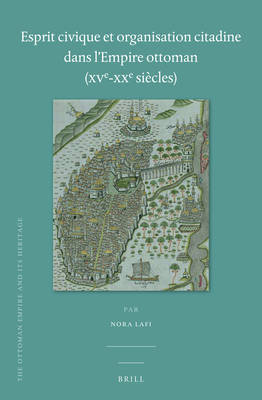
Bedankt voor het vertrouwen het afgelopen jaar! Om jou te bedanken bieden we GRATIS verzending (in België) aan op alles gedurende de hele maand januari.
- Afhalen na 1 uur in een winkel met voorraad
- In januari gratis thuislevering in België
- Ruim aanbod met 7 miljoen producten
Bedankt voor het vertrouwen het afgelopen jaar! Om jou te bedanken bieden we GRATIS verzending (in België) aan op alles gedurende de hele maand januari.
- Afhalen na 1 uur in een winkel met voorraad
- In januari gratis thuislevering in België
- Ruim aanbod met 7 miljoen producten
Zoeken
Esprit civique et organisation citadine dans l'Empire ottoman (XVe-XXe siècles)
Nora Lafi
€ 190,45
+ 380 punten
Omschrijving
This book, based on the study of original archives, discusses the roots and specificities of urban governance in the Ottoman Empire and proposes innovative interpretations of the ambiguous impact of this old regime municipal system with modernity.
Cet ouvrage, fondé sur la consultation d'archives originales, propose une étude des racines et de la spécificité de la gouvernance municipale d'ancien régime dans l'empire ottoman et analyse l'impact ambigu de ce système avec la modernité.
Cet ouvrage, fondé sur la consultation d'archives originales, propose une étude des racines et de la spécificité de la gouvernance municipale d'ancien régime dans l'empire ottoman et analyse l'impact ambigu de ce système avec la modernité.
Specificaties
Betrokkenen
- Auteur(s):
- Uitgeverij:
Inhoud
- Aantal bladzijden:
- 372
- Taal:
- Frans
- Reeks:
- Reeksnummer:
- nr. 64
Eigenschappen
- Productcode (EAN):
- 9789004364509
- Verschijningsdatum:
- 11/10/2018
- Uitvoering:
- Hardcover
- Formaat:
- Genaaid
- Afmetingen:
- 160 mm x 239 mm
- Gewicht:
- 635 g

Alleen bij Standaard Boekhandel
+ 380 punten op je klantenkaart van Standaard Boekhandel
Beoordelingen
We publiceren alleen reviews die voldoen aan de voorwaarden voor reviews. Bekijk onze voorwaarden voor reviews.









